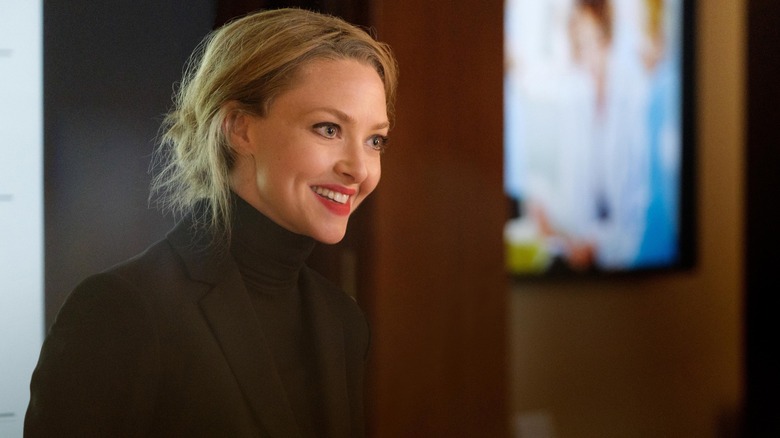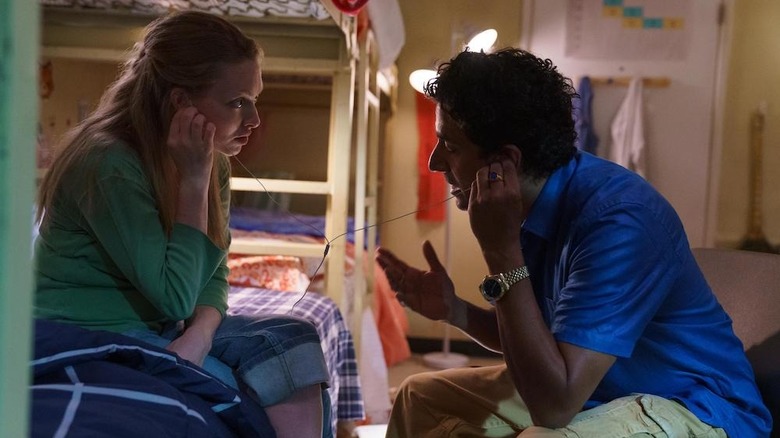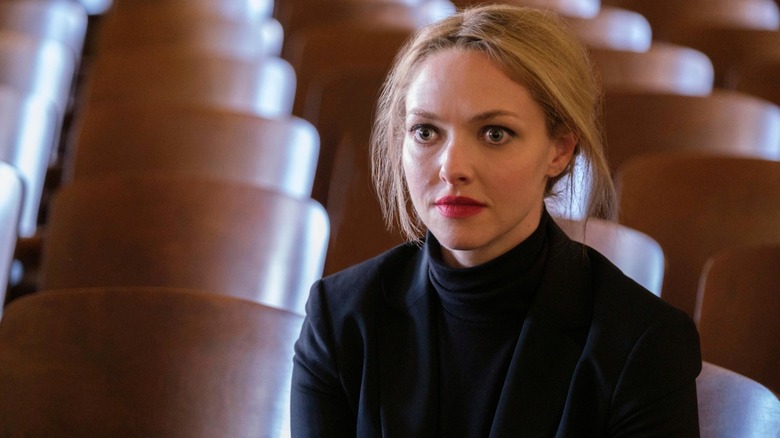The Dropout Creator Elizabeth Meriwether On Heading Down The Elizabeth Holmes Rabbit Hole [Interview]
Scammers, con artists, and silicon valley startups are taking over TV at a rapid pace, with each show touting its own understanding of the many scandals piquing audiences' interest. On the off chance that your "ripped from the headlines" quota for the years isn't already full, you might've already checked out Hulu's latest entry into the genre. An adaptation of the hit podcast, "The Dropout" tells the story behind the scandalous biotech company Theranos, which promised the world a breakthrough blood-testing device that it couldn't deliver. If you haven't had the pleasure and have yet to decide between the many scammer tales out there, "The Dropout" is certainly worth its eight-episode runtime. The miniseries tells the gripping story with bubbling momentum, led by a transformative performance from Amanda Seyfried.
Showrunner, executive producer and writer Elizabeth Meriwether ("New Girl") wanted to do more than merely recap the scandals of the billion-dollar biotech company. With "The Dropout," she delves into the male-dominated world of business leadership, the way Holmes shapeshifted to fit into her leadership role, and the many people impacted by her lies. All the while, Meriwether grapples with notions of "truth" and what it means to find honesty in fictionalizations.
In our conversation below, Meriwether unpacks the ongoing obsession behind the twisted story of Holmes' rise and fall, and what it took to bring the story to the screen.
This interview has been lightly edited for clarity.
'The point of the series for me was to raise questions, not to answer them.'
We're having this really big moment for shows and movies about scammers and Silicon Valley downfalls. Why do you think stories like Elizabeth Holmes are becoming such an obsession right now?
I don't know. It's really incredible, the amount of stories that are coming out. I mean, I do think in the past few years, the idea of an objective truth has gotten a little fuzzier. I think people have so much skepticism about everything and there's a feeling that a truth doesn't exist that we can all agree on. And so I think people are examining truth and lies, and stories that people tell that we believe. I think that's all coming under the microscope and I think that started a few years ago.
So what's your approach to "truth" when you're fictionalizing this actual story that we're all so familiar with at this point?
I went into it knowing that I'm not a reporter. As a dramatist, my role is not to present facts to people. My role is to do a lot of research and then try to tell the emotional, human version of the story as best as I can and just use my imagination to think about like, "Well, what are these characters thinking and feeling in this moment?" So, yeah. I mean, with this particular project, there were moments when I had to go away from the exact timeline or exactly what happened. But I tried to do it in an informed way and I tried to think about why I was doing that. It's definitely interesting and in a show that's all about truth.
Were you going into it with an empathetic point of view or like... a critical eye for what happened? Or is there something separate from that or something in between?
I really tried to not have judgments when I was actually writing the show. I tried to think about the characters as humans and everything that means. So all the sort of... 'what are the emotional factors? What, how did their backgrounds shape them? What are the motivations and their relationships in their lives and how [do] those affect decisions they make?' I was just trying to think of it at a human level. I really, actively, was trying not to judge them and tell... like, the point of the series for me was to raise questions, not to answer them. It was to add to the conversation as opposed to providing some kind of thesis statement about what was going on. I don't think that's my job as a writer.
'We offered her the part, and then she showed up at the first rehearsal with the voice and I was just so blown away.'
It's a real, like a rabbit hole, kind of story. And there are shocking developments-
[Laughs] Yes.
...definitely all the way through.
Yes, yes, yes! I mean, even as somebody who spent years thinking about it and researching it, I was always just surprised by elements of it. I feel like people know about her and they know about the turtleneck, they know about the voice, but there's so many different aspects to it and it just scoops up a lot of science and tech. And then also there's like... towards the end, there's like George Shultz and the investors and these sort of like heavy-hitting foreign policy people that get involved in the company. And then, at the very end, there's also the whistleblowers.
I think the character of Erika Cheung is really important to the story and it's important to me that her story gets out there. That's a character that I think a lot of people don't know a lot about. Like that this company that was started by a young woman actually was also brought down by a young woman, which I think is really interesting. And thinking about their stories in comparison to each other — like Erika came from a completely different background and had no safety net and still had the courage to be a whistleblower. So I think those aspects of this story, I don't think as many people are familiar with. So I'm kind of hoping that the series helps change that a little bit.
Even in your extensive research, you said there were still things that popped out. Is there any detail, in particular, that was a shock to come across, even with all the information?
The buildup to putting it into stores. Getting to the place where she actually said, "Yes," to this device being put into stores, taking patients' actual blood and giving them actual results. To me, I still grapple with that. Like it's... I mean, just... getting to know the build-up to it and what was going on in the company at that time, I think is... I was really taken with it.
I know the Elizabeth Holmes's voice has been a big part of the conversation surrounding the show and I'm curious, just more broadly, what the process of working with Amanda [Seyfried] to find, and tap into, that character looked like.
I did nothing with her voice. I mean, she really like came... like, we offered her the part, and then she showed up at the first rehearsal with the voice and I was just so blown away. I mean, I think what she understood was the tone. And I think what we had talked about and what we both wanted was the show to not ever feel like it was making fun of her... not making the character into a satire. That we were... yes, the voice is a part of the story but I think we both really tried to tie it to the emotions of what was happening for her at that particular moment. I wanted to show... I wanted a whole episode dedicated to her transformation and the pressures that she was under at that particular moment.
But, yeah. I mean, Amanda did such amazing work and I don't know how she did it. She's a magician. A really amazing actor and so good at transforming herself but also keeping parts of herself inside the characters that you really feel like this is a real person. Like this is a fully formed person on screen, which I'm... she makes it look easy but it's really not. And it's rare. And I'm so excited for people to see her performance because I think it's really special.
The first three episodes of "The Dropout" are now streaming on Hulu, and additional episodes will roll out weekly until April 7, 2022.


